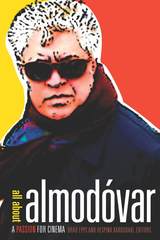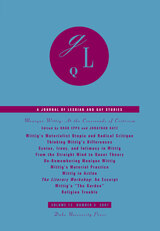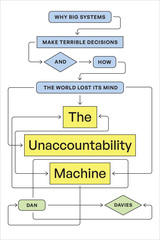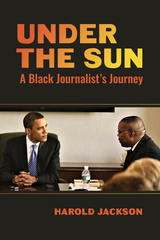
New critical perspectives on the filmmaker behind All About My Mother, Talk to Her, and Volver
One of world cinema’s most exciting filmmakers, Pedro Almodóvar has been delighting, provoking, arousing, shocking, and—above all—entertaining audiences around the globe since he first burst on the international film scene in the early 1980s.
All about Almodóvar offers new perspectives on the filmmaker’s artistic vision and cinematic preoccupations, influences, and techniques. Through overviews of his oeuvre and in-depth analyses of specific films, the essays here explore a diverse range of subjects: Almodóvar’s nuanced use of television and music in his films; his reworkings of traditional film genres such as comedy, horror, and film noir; his penchant for melodrama and its relationship to melancholy, violence, and coincidence; his intricate questioning of sexual and national identities; and his increasingly sophisticated inquiries into visuality and its limits. Closing with Almodóvar’s own diary account of the making of Volver and featuring never-before-seen photographs from El Deseo production studio, All about Almodóvar both reflects and illuminates its subject’s dazzling eclecticism.Contributors: Mark Allinson, U of Leicester; Pedro Almodóvar; Isolina Ballesteros, Baruch College; Leo Bersani, UC Berkeley; Marvin D’Lugo, Clark U; Ulysse Dutoit, UC Berkeley; Peter William Evans, Queen Mary U of London; Víctor Fuentes, UC Santa Barbara; Marsha Kinder, USC; Steven Marsh, U of Illinois, Chicago; Andy Medhurst, U of Sussex; Ignacio Olivia, Universidad Castilla–La Mancha, Cuenca; Paul Julian Smith, U of Cambridge; Kathleen M. Vernon, SUNY Stony Brook; Linda Williams, UC Berkeley; Francisco A. Zurián, U Carlos III, Madrid.
Islamicate Sexualities: Translations across Temporal Geographies of Desire explores different genealogies of sexuality and questions some of the theoretical emphases and epistemic assumptions affecting current histories of sexuality. Concerned with the dynamic interplay between cultural constructions of gender and sexuality, the anthology moves across disciplinary fields, integrating literary criticism with social and cultural history, and establishes a dialogue between historians (Kathryn Babayan, Frédéric Lagrange, Afsaneh Najmabadi, and Everett Rowson), comparative literary scholars (Sahar Amer and Leyla Rouhi), and critical theorists of sexualities (Valerie Traub, Brad Epps, and Dina al-Kassim).
As a whole, the anthology challenges Middle Eastern Studies with questions that have arisen in recent studies of sexualities, bringing into conversation Euro-American scholarship of sexuality with that of scholars engaged in studies of sexualities across a vast cultural (Iberian, Arabic, and Iranian) and temporal field (from the tenth century to the medieval and the modern).

Contributors provide critical and disparate snapshots—some more theoretical and abstract, some more experiential and concrete—of debates on, and investments in, Wittig’s theoretical legacy. Judith Butler analyzes Wittig’s “particular” universalism and offers a careful exposition of her worldview. Diane Griffin Crowder studies Wittig within a context of materialist inquiry that has often been ignored or misunderstood. Robyn Wiegman examines the complex nature of memorialization and inquires into Wittig’s place in contemporary queer theory. Seth Clark Silberman, calling attention to Wittig’s fiction, reverses the usual ascendancy of critique over narrative fiction and produces a formally innovative, if willfully “parasitic,” account of Wittig’s claim on the contributor’s imagination as he watches his mother slowly die of cancer. Alice Jardine, who situates Wittig as a disruptive and disorienting force in a mother-centered feminism, provides an autobiographically charged review of the recent history of feminism, queer studies, and the still uneasy relations between them. The issue also includes a detailed introduction by Brad Epps and Jonathan Katz; a brief personal reflection by Sandra K. Soto, a close friend and colleague of Wittig’s; and two texts by Wittig, one critical (with a foreword by Sande Zeig) and the other creative, both previously unavailable in English.
Contributors. Judith Butler, Diane Griffin Crowder, Brad Epps, Alice Jardine, Jonathan Katz, Seth Clark Silberman, Sandra K. Soto, Robyn Wiegman, Monique Wittig, Sande Zeig

Passing Lines seeks to stimulate dialogue on the role of sexuality and sexual orientation in immigration to the U.S. from Latin America and the Caribbean. The book looks at the complexities, inconsistencies, and paradoxes of immigration from the point of view of both academics and practitioners in the field.
Passing Lines takes a close look at the debates that surround eyewitness testimony, expertise, and advocacy regarding immigration and sexuality, bringing together work by scholars, activists, and others from both sides of the border.
READERS
Browse our collection.
PUBLISHERS
See BiblioVault's publisher services.
STUDENT SERVICES
Files for college accessibility offices.
UChicago Accessibility Resources
home | accessibility | search | about | contact us
BiblioVault ® 2001 - 2025
The University of Chicago Press









